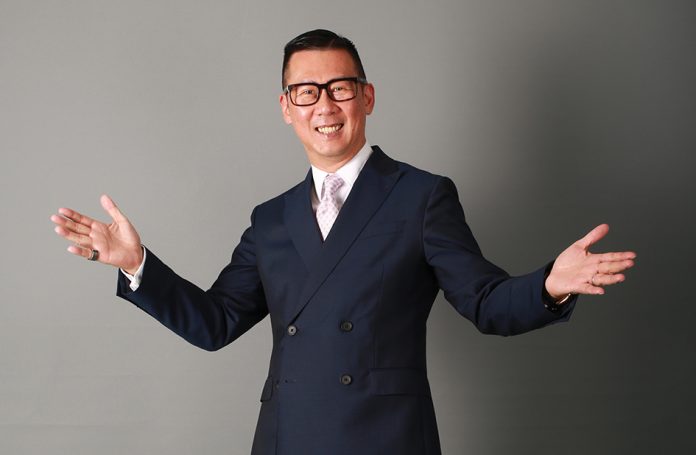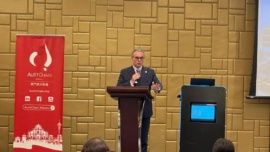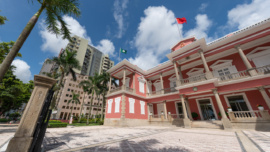After four and a half years at the helm of the gaming watchdog, Paulo Martins Chan has returned to the Public Prosecutions Office and will be replaced by Adriano Marques Ho. In an exclusive interview with Macau Business, Chan reviews the main achievements of the Gaming Inspection and Coordination Bureau (DICJ) under his leadership.
By Paulo A. Azevedo, José Carlos Matias and Nelson Moura
Photos by Luís Almoster
The restructuring and tighter regulation of the city’s junket industry is something that he is particularly proud of, especially because gaming revenue kept on growing for most of his term in office.
The former DICJ director also hinted that stricter rules for junkets could be in the pipeline, fended off criticism over the Government’s decision of extending the Macau Jockey Club’s concession, and dismissed suggestions of any clash with the new Secretary for Economy and Finance Lei Wai Nong.
Some people say that a magistrate, before retiring from his career, should never work for another branch of power. Namely, the executive branch.
Do you agree with this opinion?
P. M.C. – I don’t know who said that, but for me it’s indifferent. When I am in a different role, I will play that role properly. So, if I was in the public administration, I would take into consideration that its structure, its philosophy, is to respect the hierarchy and work for the public interest.
Whereas, in the judicial power, you work for what we call the material justice. You seek the truth and, then, you try to achieve material justice.
So, it’s quite clear what is my role and, in different roles, I act differently.
Let me ask you, very bluntly. Was it your decision to leave?
P. M.C. – Yes. Although I know that many people believe I was pressured to leave.
Let me explain something. My appointment was renewed every year until the 1st of December of the following year. According to the law, I had to inform the government of my intention to stay or go, two or three months prior to that date. The problem was that the new executive would be appointed on the 20th of December and I spoke to the former Secretary and he told me that it would be better if I stayed for the meantime and, if necessary, I could then leave and a new director would be appointed. I accepted his suggestion and I stayed, but the new Government, as it took over, knew I was on the way out. I waited until they found someone else and I left in this month of June.
So, there was no difference of opinions between you and the current Secretary, Lei Wai Nong, regarding strategy?
P. M.C. – That was not the case. I can add that, during the past six months, we cooperated very well and I felt I had his trust. We discussed all my suggestions and he accepted most of them. He held a small party for my departure and actually said a few words that resonated with me. He said that the job is temporary, but the friendship is forever. It was very kind of him to say that.
You took over the position, four and a half years ago. After all this time, do you think it was enough time to get things done?
P. M.C. – Well, in the very beginning, I accepted the challenge, by invitation of former Secretary for Economy and Finance, Lionel Leong. I had been working for 17 years as a magistrate, so I was looking forward to something new. I also wanted to test my own capabilities.
I think I was quite happy during these four and a half years, although there were lots of tough challenges and exciting times. Sometimes, I felt the satisfaction of getting the job done and sometimes, less so, but, in general, I am satisfied with what we accomplished during that time.
As you know, the prosecution office has a lack of magistrates and I feel that it was time for me to go back to the magistrate’s life. It’s a simpler life. You work for Justice and you have fewer concerns. In the public administration world, you have to consider the public interest, which are, actually, a variety of interests. So, it’s very difficult to please everyone. That is the main difference between both jobs. In the magistracy world, I really don’t need to take into account the reaction of the public and of the media. In the public administration, the media’s reaction is a very real concern.
What were the main challenges that you faced during your tenure?
P. M.C. – Actually, many different challenges. Because there were different interests involved. You have to care about the public’s opinion, because they might not understand what’s at stake. Also, drafting legislation, which was a great challenge. But also unexpected challenges, like a typhoon, to which you have to react immediately. There were a lot of difficult times.
“During the past six months, we cooperated very well and I felt I had his [Secretary Lei Wai Nong] trust”
“Macau needs to be a highly regulated gaming jurisdiction”

You mentioned several challenges and I would like you to single out an achievement that you are particularly proud of.
P. M.C. – There are a few, actually.
For example, the regulation regarding junkets and the reduction in the number of junkets. There were 270 licenses then and there are 95 now. This reduction occurred without great impact to the gaming sector. This effort is very difficult and we are trying to achieve a balance. Not many people mention this, but a balance is very important, because when you want to tighten the regulations, there usually is some sort of negative impact in the industry. However, we are bringing change in a very balanced way. As you know, starting in August 2016, our gross gaming revenue experienced a period of consecutive growth that lasted more than 20 months.
There were also improvements in terms of tackling money laundering…
P. M.C. – Yes. The other achievement involves the APG – the Asia Pacific Group on Money Laundering. We got a very high score from them and we actually didn’t publicized it. In 2017, during its meeting in Sri Lanka’s capital, Colombo, we were rated very high. In fact, only six gaming jurisdictions in the entire world got such a high rating. The report went so far as to say that in the gaming area, we are doing good job. So, I feel that, for Macau, where gaming is the main economic activity, to have such a rating from the APG – which is an independent and very objective international organization – is very important.
Last year, we were once again evaluated and got their highest scoring yet. That was a big achievement. Of course, we also have banking, real estate and liberal activities, like lawyer offices, but gaming is extremely important when making this sort of evaluation.
On a more personal level, it was also important to have received the Regulator of the Year award from the International Masters of Gaming Law. But, of course, that was also a recognition of the government’s work, as well as that of all my colleagues.
Overall, I am satisfied with our performance.
In terms of updating the gaming legislation taking into consideration that we’ll soon have the renewal of gaming licenses, in 2022, what did you and your office achieved in the past four years?
P. M.C. – Well, it’s a pity that some of the proposals have not yet reached or passed in the legislative body, but I did all I could have done.
Our main task was to prepare the draft and we did that according to what we thought it was the best way to go. Obviously, some considerations and choices were made at a higher level and I understood that, but whatever I could have done at that stage, I did.
And all of those proposals still need to reach the legislative assembly for approval?
P. M.C. – Yes. There are different steps and different departments are involved. Like the justice department [Legal Affairs Bureau], which has a word to say about the technical part. Others as well, but we did our part.
Can you recall the overall themes or areas that will be under review?
P. M.C. – Some things I can’t discuss now, because this is not the right time and I have left the position. I wouldn’t like to be discourteous towards my successor and talk about it, but, certainly, the idea is to strengthen the regulations. Macau needs to be a highly regulated gaming jurisdiction. That’s all I can say about that topic.
You were singling out achievements that you are particularly proud of. Surely there are also things that you feel frustrated about, that you were not able to achieve or complete.
P. M.C. – I really feel that the internal organic law of the DICJ (Gaming Inspection and Coordination Bureau) should be amended. We actually started working on that early on. It’s a pity it hasn’t been approved yet. Also, some of the equipment we use, needs to be replaced, but due to bureaucracy and budget constraints, we were not able to do that. It should be completed soon, but I would have liked it to be completed earlier.
The extension of the Macau Jockey Club concession, for a further 24 years, was approved two years ago. This renewal raised a lot of controversy. Looking back, was it a wise move? How did you reach that decision?
P. M.C. – We proceeded to study the situation and we submitted a study to the higher instances. The general feeling is that we should have diversification in the local economy and within the gaming sector itself. We had already terminated greyhound racing and if we did the same to horse racing, we would end up with only casino and slot hall gaming. The Government wanted to preserve some diversity and, since they needed some time to develop their business, the government allowed them more time than usual or expected. However, there are conditions involved, like paying back the money they owe. Also, if they are unable to complete the different phases of the project within the respective and agreed timings, the whole contract will likely be voided.
Some people might call junkets Macau’s undesirable necessity, but the junket industry changed a lot in past years as VIP gaming lost ground to premium mass and mass market. Now but analysts are saying that Covid-19 and the need to control mass movements, might actually help them regain some business. What’s your opinion on this?
P. M.C. – The pandemic is damaging every part of the gaming sector. There is no one entering Macau right now and, as you know, gaming is about probabilities. If there is a mass of people coming, some will win, some will lose. VIP can contribute, of course, to improving the situation, because a single player bets a great amount, but there is also a greater possibility for the casino to lose, when the number of players is reduced, regardless of the amount they bet.
Macau is doing well in the prevention of cases in this new corona virus situation, but it’s not up to us alone. Above all, we need Mainland China’s situation to improve, so that their tourists may come here. That’s the most important thing.
“The junkets treasure their licenses and I’m certain they’ll try to do better as well”
“The pandemic is damaging every part of the gaming sector”

When the SARS crisis hit the economy, telephone betting was allowed to offset the consequences of that crisis, allowing more money to roll in. Taking that crisis and the need to diversify the industry, some industry groups are lobbying for online gaming. Do you think that will happen any time soon?
P. M.C. – I can share my personal opinion on this topic, since I’m not DICJ’s director anymore. We faced many problems like money laundering and cheating.
I remember that, when I was appointed, we issued an instruction that forbade people from using their phones near the gaming tables. That was in May 2016, two days before the interim review on the gaming industry was published. It was a very important decision and the entire government was involved. After that happened, the new law that regulated the entrance and permanence inside casinos, prohibited casino workers from entering casinos during their leisure times and also forbade phone use near gaming areas. So, it was no longer just an instruction, but a legal norm. I believe it was a good development.
Currently, we are facing difficulties that might be temporary. Sooner or later, the pandemic will end. At this stage, I don’t think it’s necessary to change something that will build up and that entails a high risk of certain irregularities. I think it’s a door we should not open.
What is the extent of side betting? Do you have any way of knowing? Over the years, we heard allegations that side betting involved enormous amounts of money. What have you found about this?
P. M.C. – Side betting is a criminal offense, so we require the intervention of the police department. If memory serves me well, the pertinent law is 8/96/M, about illegal gambling. It clearly says that gambling in an illegal place is illegal gambling, which means that it’s illegal to use the results from a legal table for a side betting. We always paid a lot of attention to this issue but, as you know, it was not our specific competence, because it’s a criminal offense. Also, it was not easy to find out about it, because we just did not have enough staff to keep an eye on everyone gambling.
Paulo Martins Chan as DICJ head 2015-2020 highlights

Audit to junket promoters following the “Dore case”
Launched the revision of the law regulating junket operations in casinos
Interim review of the gaming industry and operating conditions of the concessionaires
Prohibition of using phones at gaming tables
Introduction of “self inclusion “and “problem gambling family counseling via “passport scan” system
Law banning gaming staff from entering casinos outside working hours
Extension of the concession contract of Macau Jockey Club for 24 years
Rejection of the application by the Canidrome operator (Yat Yuen) for an extension of the concession contract, putting an end to greyhound racing in Macau
Approval of two-year extension of the concession and subconcession contracts of gaming operators SJM and MGM
Paulo Chan received the “2019 Regulator of the Year for Asia/Australasia by the International Masters of gaming Law
Two-week shutdown of all casinos due to the COVID-19 pandemic in February 2020
You took office in late 2015 and, a few months before, we had the Dore scandal. When you took over, you still had to handle this. Are we free from these large-scale frauds ever happening again? How are we better protected against it?
P. M.C. – Not an easy question. One of the reasons why we reduced the number of junkets, was because some junkets were not really operating, but using their licenses to carry out illegal practices. Every year, we conduct many audits of the junkets’ operations. We can’t say that every single risk has been eliminated, but it did not happen again since then and that is a good sign. The junkets treasure their licenses and I’m certain they’ll try to do better as well.
That particular case highlighted an important question, which was the co-responsibility of the casinos in the bets. If that was ever proven in court, it would open a real wasps’ nest. As far as you know, is that situation in the past or anything lingering until today?
P. M.C. – As far as I know, there are still more than ten cases in court. A few reached the second instance court already and, in one case, the court decided that the concessionaire is also responsible. There is now an appeal pending in the Court of Final Appeal. We don’t have a decision yet, but this case will be very important for the whole sector. If the concessionaire is found to be responsible, they will be very careful regarding the junkets and, in addition, the relationship with the junkets will also change. It all depends on the decision of the Court of Final Appeal.
That would raise other questions regarding the relationship between the concessionaires and the junkets, because some of the concessionaires don’t even enter the physical space provided to the junkets inside the casinos. How is any control possible under such circumstances?
P. M.C. – Well, if the license is yours, the problem is yours. You have to find a way to control, according to the contract between the junket and the concessionaire. So, if one day, the court decides that the concessionaire is also responsible, the gaming operator will have to be more careful when selecting the junket or they’ll have to manage VIP gaming by themselves.
One can argue that it’s also a good reason for the government and the regulator to do better. To increase the transparency of the regulatory legislation and prevent these kinds of situations that, ultimately, affect the entire image of Macau.
P. M.C. – Exactly. There’s not a lot more I can tell you about the new laws, but I would like people to know that the new legislation about junket promoters includes a specific type of criminal offense to handle this kind of situations. The illegal raising of funds by junkets, which is more serious than the illegal raise of funds in the general financial system.
Is that a new chapter in the new law?
P. M.C. – Yes, in the proposed draft for the new law.
Despite the consolidation and transformation that we are witnessing in the junket industry, the existing perception is that junkets are still too powerful, when compared to the other players in the gaming industry, including the concessionaires. Is that the case?
P. M.C. – I think there is a reason for the existence of junkets and concessionaires are not stupid. They sign a contract with a junket, because they feel they have a need that only a junket can satisfy. It’s the market working and we operate in a free economy. As long as no one is committing any irregularities, the watchdog is fine with it.
The million dollar question on everyone’s mind is regarding the new tender. The future of Macau, post-2022. During your tenure, what were you able to do in regard to the new face of gaming liberalization in Macau? Some people worry that we are already halfway through 2020 and there might not be enough time left to properly handle the new tender.
P. M.C. – What I can tell you is that we have different teams working on several issues and that the government does not depend on one or two individuals. I can assure you that the government is and will be prepared to properly handle the tenders. During the last Policy Address, the Chief Executive announced the tenders and, of course, they will happen.
So, in your opinion and given you experience, people should not be worried. All stakeholders can relax about this specific topic.
P. M.C. – Yes. I don’t think there will be any problem whatsoever.

We had this very unique situation occurring in Macau, when the three initial concessionaires became six (with the additional three sub-concessions) at the end of the day. Does the so-called 3 + 3 system has a future?
P. M.C. – I will not give you any opinion about the future, but I can tell you my opinion as a legal operator. As a lawyer, if you will.
The gaming law states that there are three gaming concessions, but the law allows the government to authorize further sub-concessions. The government decided to authorize six (three concessions and three sub-concessions) in total. One can say it’s convenient or inconvenient, but cannot say it’s illegal. It’s in the domain of the government’s discretionary power. This is a concept from Public Administration Law. The law itself provided for this scenario. In my opinion, the three sub-concessions are legal.
“We had already terminated greyhound racing and if we did the same to horse racing, we would end up with only casino and slot hall gaming”
“I believe Adriano Ho is absolutely a suitable person for the job”
How about third party operations? The so-called satellite casinos? Will there be a need to clarify those situations?
P. M.C. – That situation occurs when the concessionaire leases part of its premises for another entity to operate a casino and that possibility is also covered by the current law. There is no question it’s legal. Again, you can discuss the convenience, but not the legality.
My opinion is that different concessionaires have different kinds of markets. Higher end or lower end and some chose this and others didn’t, according to their respective markets.
Nearly years ago, Macau opened up the gaming sector. These years since the liberalization allowed the government and society to better plan for the future. Do you feel that this time was sufficient for us to know what needs to change and that change is indeed coming?
P. M.C. – That is the reason why the government did the interim review and it served as a sort of body check-up, to identify any problems and weaknesses, as well as the strong points of the industry. Of course, from a macro-economic perspective, Macau needs to diversify, in order to reduce its dependency on gaming. We should promote other economic sectors.
As we reach the end of this interview, we would like to know, according to your experience of four and a half interesting years, what is the ideal profile for a DICJ director?
P. M.C. – It’s hard to say. I think that the most important thing you need is integrity, because there are many interests involved. There is definitely an advantage to being a lawyer or have a law degree, because it involves so many legal aspects. You also need to be a good communicator, in order to understand what is going on in the sector from the people that actually operate there. Also, the usual traits of being hard working and understanding.
Does Adriano Ho fits this profile you just described?
P. M.C. – Absolutely. I know him for many years and he is a good police detective and very hard working. I believe he is a suitable person for the job.
























